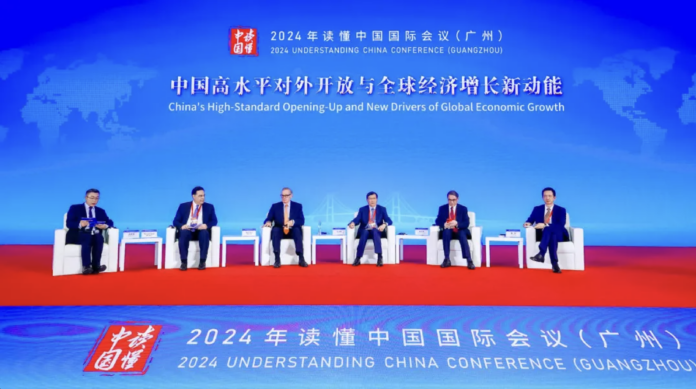
From December 2 to 4, 2024, the “Understanding China” Conference was held in Guangzhou, bringing together global dignitaries, renowned scholars, industry leaders, representatives of international organizations, and other Chinese and foreign guests. The conference focused on Chinese modernization and new opportunities for world development.
The Conference, now in its eighth session, has become one of the most influential platforms for understanding China’s development strategy. This marks the fifth time the conference is being held in Guangzhou.
On the afternoon of December 3, 2024, the Conference hosted guest dialogues. Guests from various countries discussed the positive global impacts of China’s reforms. Zheng Yongnian, X.Q. Deng Presidential Chair Professor, the Presidential Chair Professor, the Founding Director of the Advanced Institute of The Institute for International Affairs, the Chinese University of Hong Kong, Shenzhen, emphasized in his speech that China’s opening-up is a rule-based process. He highlighted the transformative power of China’s policies and global capital in reshaping the global trading system.
As the rapid changes of this century continue to unfold, countries worldwide face new risks and challenges but also encounter fresh opportunities for development and progress.
Zheng Yongnian highlighted that a key characteristic of China’s current open-door policy is its emphasis on unilateral opening. He referenced the recent introduction of the visa-free policy, which has drawn many foreigners to China. These visitors have shared numerous short videos about their experiences on social media, providing Western societies with a more authentic view of China. Zheng emphasized the importance of extending unilateral openness not only to developing countries but also to developed Western nations.
During the 27th China-ASEAN Leaders’ Meeting this year, China proposed exploring initiatives like unilateral openness toward ASEAN countries. Zheng remarked if China’s unilateral opening to ASEAN is realized, it will bring about a significant transformation, creating a China-ASEAN common market. This would be a remarkable achievement and a momentous development for the world.
China continues to broaden its scope of unilateral opening, accelerating efforts across various sectors. Zheng cited the recent release of the detailed work plan for wholly foreign-owned hospitals in nine cities: Beijing, Tianjin, Shanghai, Nanjing, Suzhou, Fuzhou, Guangzhou, Shenzhen, and the entire island of Hainan, issued by China’s National Health Commission, Ministry of Commerce, and other departments. He described this as a clear example of China’s deepening openness to the world as openness reflects a nation’s confidence, the more open a country is, the more confident it becomes, creating a virtuous cycle of openness and self-assurance.
Zheng believes that China has the capacity to further the globalization process through initiatives like the Belt and Road Initiative, BRICS, and other cooperation mechanisms. Donald Trump’s impending second term has caused widespread concern. Zheng remarked that China cannot underestimate the potential impact Trump may have on the global trading system, and China must not undervalue China’s capability to reshape it.
Despite U.S. opposition to the Belt and Road Initiative from its inception, China has remained open to the U.S. “China’s approach to opening up is inclusive and adaptable,” Zheng stated. “China is ready to welcome any country willing to participate in new cooperation mechanisms and systems.”
Source: IIA, Xinhua, China Daily



